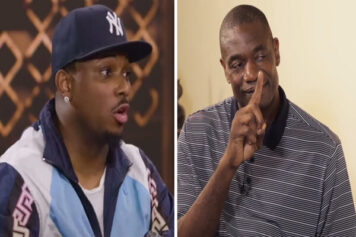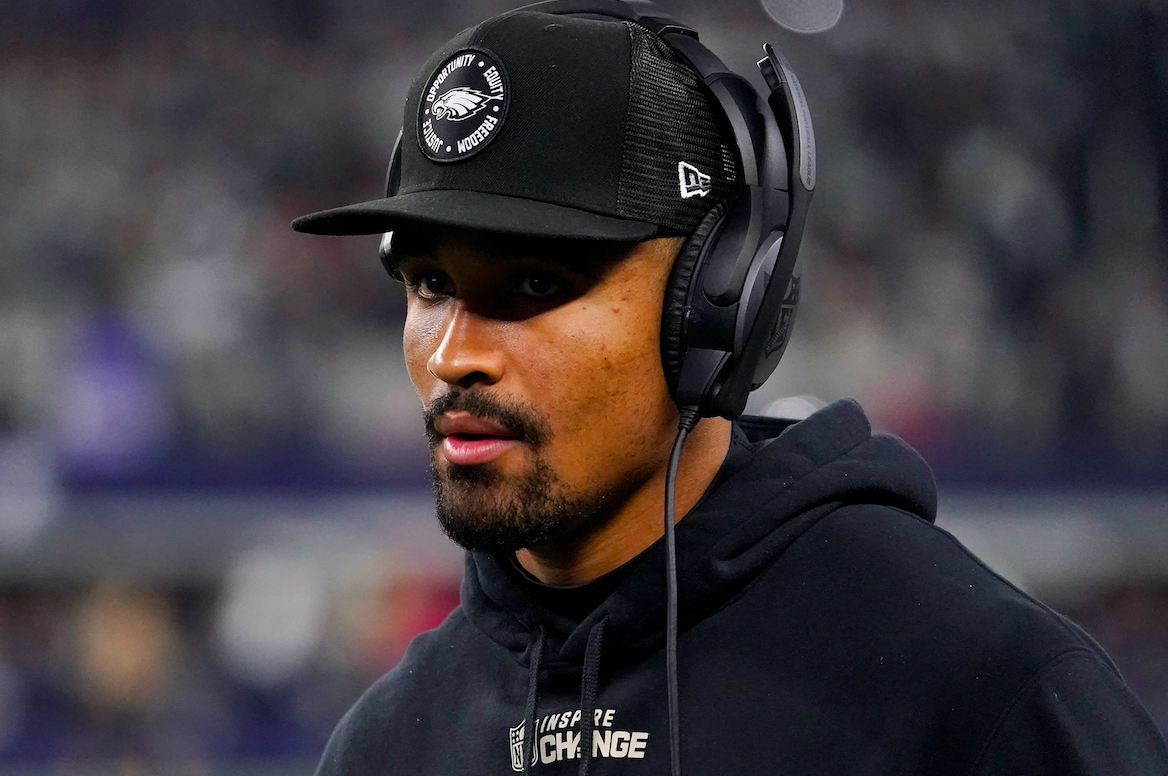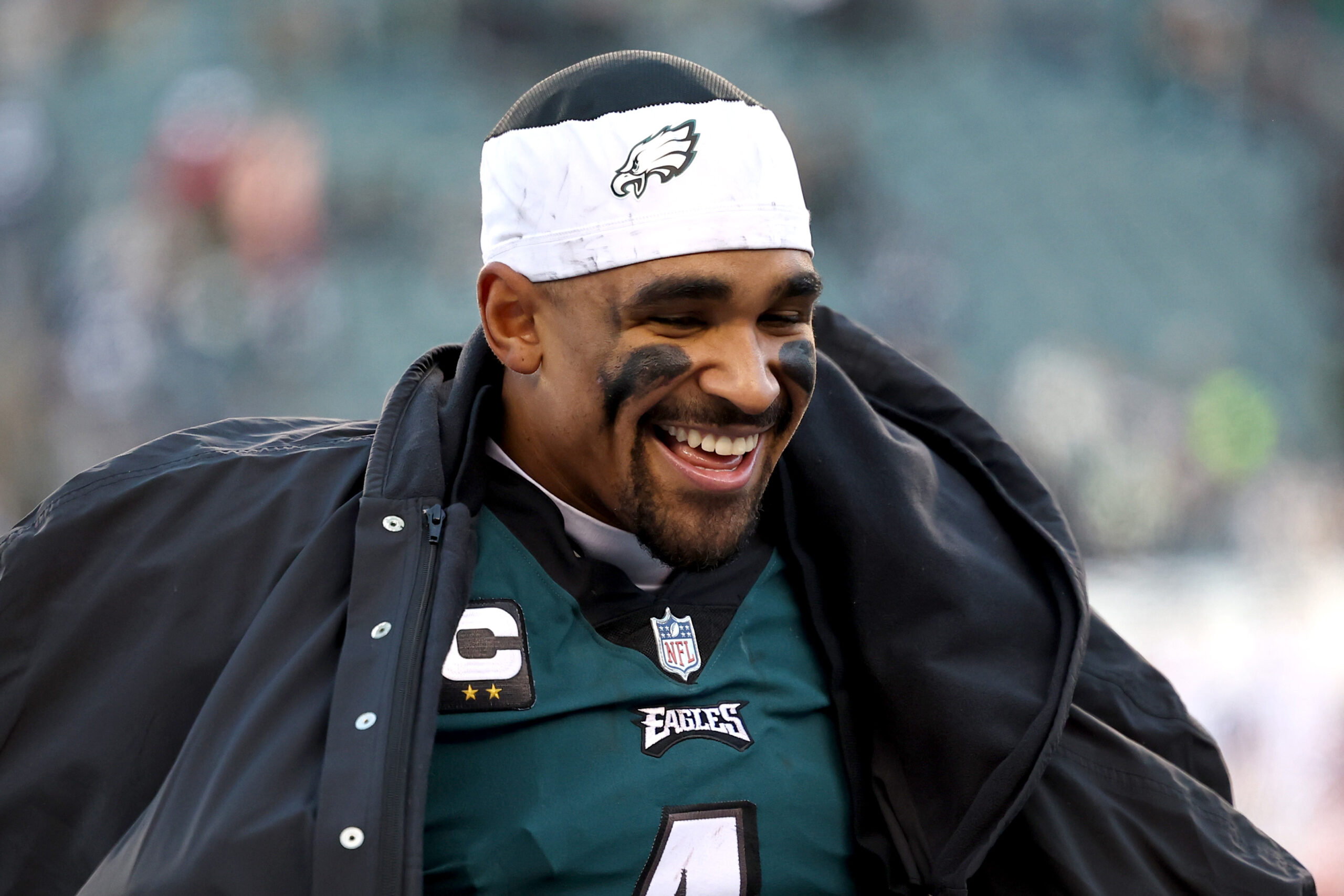Riley Cooper should get the rapper pass.
There’s no empirical evidence to corroborate the following statement and surely Riley Cooper hasn’t been foolish enough to even hint at it as he tries to retreat from public scorn, but I’d bet a good amount of cash that Cooper has heard his teammates use the word cracker before. If he hasn’t heard it in the Philadelphia Eagles locker room, then he’s encountered it on the field from an NFL opponent or during his SEC days at Florida. He’s probably also been derisively called a “white boy” at some point.
Although neither term carries anywhere near the putrid history of hate, enslavement and oppression that is attached to the word nigger coming out of white people’s mouths, the phrases cracker and white-boy are mainly used to demean and diminish white folks. Coming out of a black, Hispanic, Arab or Asian mouth — those two words are past inappropriate. Case closed. But it happens.
The Eagles welcomed Cooper back into the locker room Tuesday. After practice, Cooper faced the media and said he talked to each of his teammates and “ everyone seemed to support [me]. ” Part of this general team-wide forgiveness has to do with morals for some (Jason Avant mentioned Christianity). Cynics will even say that Jeremy Maclin’s injury was a factor. But some of these players had to recognize that they’ve had a moment (or moments) when they have stooped to epithet-hurling during their adult lives and – regardless of where words register on the PC-scale – they might have sensed that an entrenched, obstinate lack of sympathy might border on hypocrisy.
The latter sentiment will probably never come to light because, well, what right-thinking Eagle would just come out and admit, “You know, I called white dudes ‘cracker’ enough to put my PC-badge away for a sec.”
The word nigger is probably the ugliest in the American lexicon because slavery is probably America’s ugliest skeleton hanging in its closet. Cracker isn’t pretty, though. It’s often said that the word originated as term used to refer to plantation overseers that used to “crack” the whip. During the George Zimmerman trial, however – reacting to Rachel Jeantel’s testimony that Trayvon Martin referred to Zimmerman as a “crazy ass cracker” – CNN.com ran a piece on the history of the word.
It quoted Bill Ferris of the Center for the Study of the American South at the University of North Carolina, saying “it emerged in the 1700s as a descriptive term for drovers who used small whips to move their livestock through the pine barrens along the Gulf of Mexico.”
Whatever its origin, the word lost its innocence long ago. And, although these two words (nigger and cracker) are probably seldom heard in a locker room (especially white players using the n-word), I’ve been in enough collegiate and pro locker rooms to know that “white boy” is a term thrown around willy-nilly. Sometimes it’s said in jest: “Hahaha. You’re a crazy white boy, man. I love you.” Other times it is absolutely used to cut a man down: “Whatchu gonna do, white boy?”
Black men began referring to each other as “man” as a reaction to the constant emasculation of being called “boy” in the days of Reconstruction and Jim Crow. That’s a fly suit, man. “Man” meant something. The same can be said of the way the black community grew to employ the phrase “white boy” over the past 50 or so years, a phrase that took hold during the black power movement and hasn’t really gone anywhere since.
I have friends and family members that openly use white boy when referring to white men. I hate the term cracker – it makes me wince. But I have friends and family members that have dropped the C-word, too – sometimes without much provocation, at all. It almost always elicits some type of visceral scolding from me. From the fourth grade on, my parents sent me to a diverse, liberal, kumbayah public school that introduced me to many white kids that I continue active friendships with to this day. These men and women are the exact opposite of racists and bigots. T
Those are experiences and relationships that inform my opinion of white people the most. But when I once asked a black friend why he was so free with the word cracker he told me, “They all crackers to me, because we all niggers to them.” That was not the product of ignorance as much as it was the product the types of interactions he’s had in his 30-something years living in Buffalo, my hometown, and a rust belt city that many out-of-towners view as a genial small city, but honest Buffalonians know to simmer with racial tensions.
I bring this up because there’s always been the prevailing wisdom that familiarity is a cure for prejudice and bigotry. But does it, though? Cooper has spent the past eight years playing football in the SEC and NFL. For now, we will take the man at his word, giving him the benefit of the doubt, and believe him when he said he wasn’t raised to use the N-word. But what if his past eight years of constant contact with black teammates perpetuated what a bigot might refer to as “nigger-behavior”?
A bigot would associate any number of things – a style of dress, manner of speech, taste in women and particular world views – and deem it derogatory, less-than. A pro football player in Philadelphia is interacting with far more Meek Mills than Michael Nutters. That matters when it comes to this faulty notion of reforming bigots through, basically, osmosis.
The jock culture is full of foolishness – especially football locker rooms. If an alien came to earth and asked that we show him the best versions of various American cultures, we ain’t takin’ that alien to an NFL locker room. Trust that.
Many, if not most, collegiate and professional rosters house a closeted bigot (or two, or three, or 20). It’s just that the men that allow these feelings to surface – John Rocker, Tim Hardaway – are rare. They’re there, though. That we don’t hear about straight-up race wars in locker rooms is somewhat remarkable.
This is especially the case for the NFL, which, unlike the NBA, still has a large contingent of white players and a critical mass of the players that come from environments and cultures that aren’t too far removed from or still embroiled in America’s ongoing problems with racism.
Yes, it’s remarkable – but it’s not unexplainable. It’s an indication of the true unifying nature of organized sports. Like the military, sports has a way of using a common goal as the impetus to put differences aside. It’s even true for the fans. A cop is high-fiving a black guy in the stadium Sunday afternoon, profiling him on the streets Monday evening.
But we can’t escape the double-standard here. We’re not talking about the bird-brained logic of some folks that, because black folk have co-opted nigger and flipped its mean and pronunciation (no black person calls another black person a nigger, unless they want to fight, it’s “nigga” and there’s a canyon-sized difference), we can’t demand that white folks refrain from using it.
No, we’re talking about the liberties that many white players allow their black teammates to take when it comes to how they’re referred to. Fact: “black boy” is just as off-limits as the n-word and you won’t hear that in too many locker rooms or playing fields.
The same can’t be said about the opposite. And for all the hip-hop hand-wringing (like Kool Herc or Kool Moe Dee originated the modern use of the word n-word), it’s far more startling to listen to Straight Outta Compton and hear Ice Cube use “cracker,” like it made his teeth white. Cee-Lo Green is one of America’s biggest pop stars…listen to the title track off Soul Food. A young, burgeoning rapper can come out of his mouth all kinds of ways in reference to white folks and it won’t shatter his career. Let a young country star start talking slick about black people and watch his or her album get cast as hate-mongering.
Sometimes, we’re so busy with moral outrage and/or knee-jerk defense mechanisms that we let teachable moments pass by, undermined by a one-track mission to wag a finger at the initial offense. At its core, the Riley Cooper situation is about one man’s use of a despicable word. But the n-word doesn’t have a monopoly on hateful or antagonizing speech, nor is this type of speech the sole province of white people. This should really go without saying, but we all need to do better.



